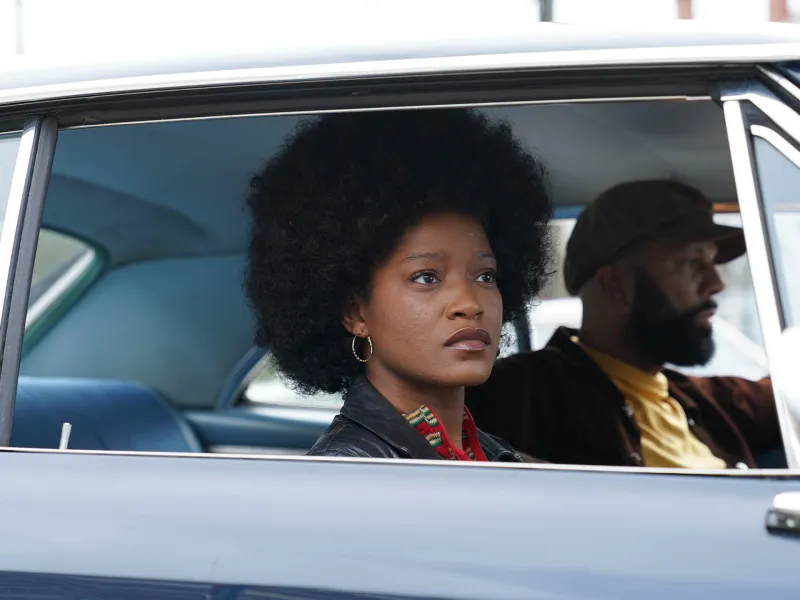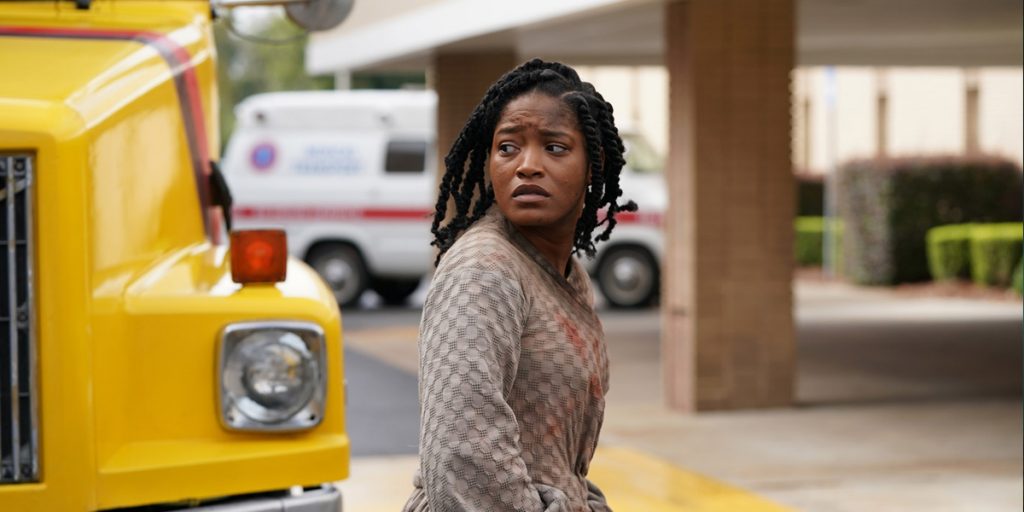Alice ‘s scattershot screenplay causes storytelling stumbles here or there, but Keke Palmer’s persistently persuasive lead performance (somewhat) steadies the ship.
Ever since her breakthrough role in 2006’s Akeelah and the Bee, it’s been clear that Keke Palmer has “it” – that indiscernible and indescribable yet essential quality that separates the average actors from the stars. The way she commanded the screen even alongside acting titans like Laurence Fishburne and Angela Bassett was stupefying to see, and that natural charisma carried over into her starring role in the Nickelodeon series True Jackson V.P., which further powered her to strong supporting parts in shows like Scream Queens and films like Hustlers. Still, since 2006, Palmer has been searching for a project on par with Akeelah that would display the whole range of her acting abilities and take her to “the next level.” Sadly, Krystin Ver Linden’s Alice – which follows a woman (Palmer) who believes she is enslaved on 19th Century plantation in Georgia only to escape and discover that it’s actually 1973 and her whole life has been a lie – doesn’t provide Palmer with the most promising material, but it’s still a stunning showcase for her tremendous talent nonetheless, as she rises above the script’s shortcomings to deliver a daring star turn that is equal parts tender and thrilling.
For those who have seen 2020’s Antebellum, the basic premise for Alice might sound a little familiar, as the third act twist in that Janelle Monáe chiller also concerned a woman discovering that the Southern slave plantation she worked on was a sham, but that film ended with this revelation, while, in Alice, it’s merely the finale of the first act. Additionally, by setting her film in 1973, Ver Linden further separates her story from Antebellum – which took place in present day – and adds an affecting new angle to Alice’s adventure by having her enter an environment in which Black liberation is burgeoning, with many starting to champion civil rights movements as Blaxploitation flicks thrive at the cinema.
It’s undoubtedly a compelling concept, but despite avoiding one of Antebellum’s major missteps (focusing too much on the pains of the plantation Monáe’s Veronica finds herself on as opposed to her righteous revenge and retribution) Alice stumbles into one of its own – a rushed runtime that rarely gives its protagonist the proper rest to address the trauma of the life she’s led up until that point in favor of turning her into a Pam Grier-esque action star almost on the spot.

Alice’s second act should essentially serve as a bridge between the brutality of the slave plantation-set beginning and the (literal) fiery finale in which Alice dispenses justice to those who duped her and did her wrong for the entirety of her life up until this point, but there isn’t enough time afforded to assessing Alice’s anguished psyche upon her escape in the middle portion of the movie. Instead, she’s confused for a few scenes, suddenly learns what slavery is, and then acquires some Blaxploitation-esque attire to go confront a pest from her past and subsequently put a plan in motion to make everyone who ever punished her pay. There’s a way to get Alice to this same outcome and actually make it believable, and that’s by giving her – and the film – time and space to breathe in the second act and reckon with the evil she’s endured, handling that hurt and shaping her spirit into something stronger, taking influence from the Black female icons of the era and enacting revenge on the psychos from the plantation she used to call “home.” However, Alice doesn’t put in that work. Instead, it wants us to believe that she’s a changed woman almost overnight, learning of her life-long deception and deciding to play the part of Pam Grier in her own real-life war with white men only a scene or two later.
However, if this evolution is effective at all, it’s entirely due to Palmer’s persistent persuasion in her performance, as her relentless commitment to this character can convince us of the promptest plot developments imaginable. In every phase of Alice’s arc, she’s beautifully believable, from the torment of her time on the plantation to her woe and wonder as a “fish out of water” upon her escape to her riveting reclamation of her agency in the film’s rousing resolution. It ranks near the top of Palmer’s best performances to date, and even though the script doesn’t support her as well as it should, Palmer does her damndest to fill in the blanks it leaves on Alice’s transformation, and oftentimes, she does still elicit engagement from the audience in spite of the story’s other stumbles. Common (Suicide Squad, John Wick – Chapter 2) is also quite affable as Frank, Alice’s fast friend who accompanies her on her journey after rescuing her on the side of the road, though he too is undercut by a screenplay that shortchanges his own subplot of familial strife in favor of the more “fun” Blaxploitation thrills of the third act.
Alice isn’t entirely without merit – mostly due to Keke Palmer’s powerhouse performance in the lead role – but it is unfortunately an uneven effort all-around, with Ver Linden’s screenwriting not able to match the might of her more distinguished direction. With both Antebellum and now Alice, it’s clear that the concept of a modern-day (or near-modern-day) operational plantation that keeps 20th/21st Century African Americans enslaved is rife with opportunities for intriguing thematic insight into today’s race relations, but both films ultimately miss the mark when it comes to effective execution of these subjects in their storytelling, leaving it to their leading ladies to pick up the slack. Thankfully in Alice, Palmer audaciously answers the call, and she still manages to walk away with more admirable work to her name.
Alice premiered at the Sundance Film Festival on January 23, 2022. and is now available to watch on digital and on demand.

